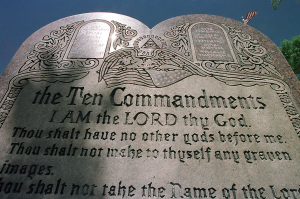Subjecting Local Congregations to Off-Site Control
In the New Testament, no one ever served as a spiritual leader for a congregation that he wasn't also feeding. God's Word prescribes no leading where there is no feeding. Every "elder" in the New Testament was required to faithfully teach the Word of God (2 Timothy 2:24), and to serve alongside the believers in that particular congregation. The word "elder" in the New Testament is interchanged with the words "overseer," "pastor," and "bishop."
Biblical church leaders must manage and lead not only in administrative tasks, but more importantly, in "prayer and the ministry of the Word." (Acts 6:4) Safe leaders in a church are those whose primary passion and calling is prayer, the proclamation of the Gospel, and the teaching of the Scriptures. The church is not a business, even though it has necessary financial matters to conduct. The church is a spiritual organism. You cannot lead a spiritual organism with people who are less than qualified spiritually....or who are as absent from the family as a "deadbeat dad." Whatever other abilities they may have, their spiritual qualifications are what determine whether or not they are safe to lead and fit to feed.
At one point in history, Christians began to experiment with "out-of-town" church officials who were given authority over congregations which they were not personally feeding. Bad idea. God's blueprint is the way to go. Congregational ministry needs to produce strong leaders from within who are fully capable of serving and supervising their own congregation. Every New Testament church had a plurality of on-site overseers; that is, a plurality of pastors or bishops or elders (whichever term you prefer) who were active disciples in that particular congregation.
It would be ridiculous and dangerous for one "father" to supervise and lead the families of ten different homes. We might call such an arrangement a "cult" because of how much power it gives to that one man. He may call himself their "father," but that is not how the Bible speaks of a "father" and "mother." When people invent their own system in order to give a man much authority over multiple homes or multiple congregations, it quickly produces followers who seem unable or unwilling to break free from such control. These followers are conditioned to continually subject themselves to that type of long-distance authority.
When a congregation, whether Catholic or Protestant, relies upon out-of-town church officials to supervise their ministry, they have handed the children over to parents who don't live at home. Like a "father" or "mother" who supervises ten homes, this hierarchical arrangement with a "mother church" will not produce enough mature local leaders in a congregation. It will keep most of the power and control in the hands of the out-ot-town officials, which is of course just the way they like it. This unhealthy dynamic is never promoted in the New Testament and is a very unfortunate development in the history of Christianity.
The strongest case against this type of church polity is the example of our Lord Himself. Jesus did not mentor His disciples from an out-of-town office. He was with them constantly. His feeding and leading among them took place daily. Therefore, church officials who are not feeding the local sheep have no business leading and supervising the local sheep. Let those officials ask God to help them find their own congregation to feed and lead....if indeed they are truly called by God to serve as New Testament elders rather than denominational employees.
Out-of-town church bureaucracy is unnecessary and actually harmful to the healthy development and growth of congregational leaders. Power corrupts....and so does unnecessary politics in the church. Any association of Christian congregations that gives out-of-town officials power over multiple churches is a system that caters to the global human organization (the denomination) more than to the local spiritual organism (the congregation) which Jesus instituted. Whether they realize it or not, congregations don't need that crutch. It actually stunts their growth and "freezes" them from stepping out in faith unless their "mother" approves. That is the life of a child....and not the life of a grown man, woman, or congregation of mature believers.
Man is very talented and persuasive, both in the business world and in the church, at selling the need for his product and his services. And it almost always seems to involve money. Church officials in global organizations are adept at intentionally creating a codependency between themselves and the local congregations in their region or district. After all, someone has to pay for the salaries of these out-ot-town church bureaucrats....as well as the global programs they chose to fund from their corporate offices. By creating a system where congregations are required to continue breastfeeding from the milk of the mother church, you have created a church culture that feels "normal" and even necessary for the advancement of the Gospel.
Go back to that example of the "father" who is supervising ten homes. What if the children in each home were expected to send a portion of their earnings to that man? Now he sounds more like a pimp than a loving dad. Pimps don't like people to mess with their system. It stops the flow of money and it forces them to find new avenues of income to support their lavish spending habits. I guess this means that pimps aren't safe to lead their "family."
So what am I saying? That all church officials who oversee dozens or hundreds of congregations are intentionally "pimping out" those churches? No. A good number of those denominational employees are solid Christians. Unfortunately, they have voluntarily become part of a hierarchical system that is not based on the New Testament....anymore than the actions of a cult or a pimp can be justified by the Word of God. Good men who serve within highly politicized systems often end up settling for what is best for the "company," even if some of the "little guys" get shoved aside now and then. I can hear some out-of-town officials saying in response, "OK....so maybe this isn't the way Jesus led his disciples....but He didn't have our bills to pay either." Precisely.
Jesus was too busy preparing to pay a much larger debt. It seems like that message of the cross should be the focus of every Christian congregation....rather than whether or not the out-of-town "company men" approve of the local efforts to make disciples. Who died and made them king? Again I say....let each out-of-town official go and prayerfully find his own congregation to feed and lead....if indeed he is called by God to shepherd Christ's flock.




























